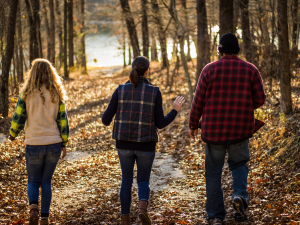News Post
The Health Benefits of Time in Nature
Published on January 14, 2020
Most outdoors enthusiasts intuitively recognize that spending time in nature offers a variety of health benefits – from improved emotional outlook to feeling more energetic—even if they aren’t aware of the science backing up their personal experience.
By Sheree Martin, JD, LL.M., Ph.D, Sheree Martin Law, LLC
There’s a growing body of medical and health-related empirical research that shows measurable improvements in many biomarkers associated with health, wellness and perceived quality of life as a result of time spent in nature.
I want to encourage Alabama lawyers to consider the science (some of which I briefly summarize below) and consider finding a way to incorporate some time in nature at least weekly—and encourage staff and family members to do the same.
I’m fortunate to have developed a love of nature at a young age. I grew up with easy access to “the woods” where I could be a “free-range” kid, and I carried my love of hiking and nature-watching into adulthood.
In my mid-30s, I decided to take some time off from the practice of law to pursue other interests, earn a Ph.D., and work as a college faculty member. It was during this era–while engaged in my own research relating to environmental communication–that I first learned of the growing body of medical and health studies looking at the relationship between time in nature, access to green spaces and physical and mental health.
I also discovered a Japanese practice called Shinrin-Yoku. The literal English translation is “forest bathing.”
Shinrin-Yoku is a formal program developed in the early 1980s to have Japanese workers spend time in forest settings to mitigate the intense stresses of Japanese business culture. Although Shinrin-Yoku is forest-focused, other types of natural environments and settings offer proven benefits. Japanese companies implemented the practices and Japanese health researchers began studying the effects and publishing their research.
The Japanese success with Shinrin-Yoku inspired a global wave of medical research seeking to identify the specific health markers that improve through exposure to nature. The benefits are wide-ranging and go beyond what might be expected from walking or other physical activity.
In other words, the benefits come through exposure TO nature, as well as physical activity IN nature. It’s not just about exercise—the natural world itself provides an extra boost.
Research
Researchers out of Stanford University, in several studies from 2015, found improvements in measures of depression, lower anxiety and better cognition. In one study the research team used brain scan measurements to demonstrate that simply walking in natural settings produced significantly better brain scan results in areas of the brain associated with depression and anxiety compared to walking in urban settings. In another study, the Stanford research team used psychological assessment tools to measure the effects of nature vs. urban walks on affect and cognition and found improvements in measures of anxiety, less rumination and an increase in working memory performance.
Citations: >>https://news.stanford.edu/2015/06/30/hiking-mental-health-063015/ >>https://www.sciencedirect.com/science/article/pii/S0169204615000286
A meta-analysis of research on the health benefits of exposure to nature by researchers from the University of San Francisco published in 2017 analyzed a variety of empirical studies showing that nature and various nature-related “interventions” improved myriad biological markers and other outcomes associated with better health. (Hansen, Jones & Tocchini, 2017). Specifically, the studies considered in the meta-analysis found results that demonstrated:
- Improvements in Heart rate
- Lower Blood pressure
- Lower Cortisol Levels
- Improved sleep time and sleep quality
- Lower levels of depression and anxiety
Decreases in self-reported perceptions of pain, and - Improvements in self-reported quality of life measures
Similarly, with regard to improvements in biological markers of stress, a meta-analysis of medical research on the effects of time in nature and cortisol levels by Antonelli, M. Barbieri, G. & Donelli (2019) found that time in nature resulted in measurable improvements in short-term measures of cortisol among study participants.
Researchers at Kansas State found that surgical patients viewing flowers in their rooms had faster and better surgery recoveries compared to those who did not.
A study by researchers at Penn State found that patients whose hospital room windows looked out over a natural setting had better outcomes than those with windows facing brick walls.
At least one group of researchers has found that simply viewing photos of green spaces and natural environments (in a lab setting) triggers better biological stress response markers compared to viewing photos of built environments (buildings, urban spaces, etc.)
These last three studies cited above provide evidence that the benefits come from our response to nature rather than something we do while in nature that yields the improvement. It seems there is something to that old advice to just “stop and smell the roses.”
One thing is for certain: Spending some time in nature—or just looking at trees and flowers and birds—won’t hurt you. And it doesn’t cost a penny to touch a leaf or look at a tree.
####
Other Resources:
Books
The Nature Fix: Why Nature Makes Us Happier, Healthier, and More Creative by Florence Williams (2018)
Your Brain On Nature: The Science of Nature’s Influence on Your Health, Happiness and Vitality by Eva M. Selhub, MD, and Alan C. Logan, N.D. (2013)
Forest Bathing: How Trees Can Help you Find Health and Happiness by Dr. Qing Li (2018)
Your Guide to Forest Bathing: Experience the Healing Power of Nature by M. Amos Clifford (2018)
Internet Resources Other Than Medical Research:
Dr. David Perlmutter, M.D. Website: The Healing Power of Nature
Time magazine: ‘Forest Bathing’ is Great For Your Health (2018, May 1)
Oprah.com: Shinrin-Yoku: The Japanese Practice that Could Transform Your Day
